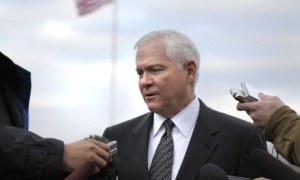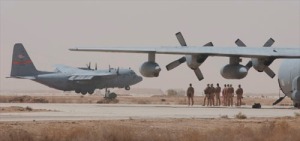Iraqi judge: Shoe-throwing journalist was beaten

According to the investigating Iraqi magistrate, Muntazer al-Zaidi, the Iraqi journalist who threw his shoes at visiting U.S. President George W. Bush and called him a “dog,” was beaten while in custody and had bruises on his face to show for it.
The Guardian reports:
The Iraqi journalist who threw his shoes at George Bush was beaten afterwards and had bruises on his face, the investigating judge in the case said today, as a senior cleric in Iran urged others to wage a “shoe intifada” against the US.
The reporter, Muntazer al-Zaidi, had bruises on his face and around his eyes, said the judge, Dhia al-Kinani said.
Zaidi was wrestled to the ground after throwing the shoes during a Sunday press conference by Bush and the Iraqi prime minister, Nouri al-Maliki.
He remains in custody and is expected to face charges of insulting a foreign leader.
Kinani said a complaint about Zaidi’s treatment had been filed on his behalf and court officials “will watch the footage to identify those who have beaten him … He was beaten and we filed a case for that. Zaidi did not raise a complaint and he can drop this case if he wants to.”
Clerics in Iran have praised al-Zaidi’s bravery, and his actions have been similarly hailed throughout the Middle East and elsewhere in the world. Venezuelan leader Hugo Chávez said that, while the throwing of shoes was uncalled for, the sentiment was justified. Al-Zaidi has asked the forgiveness of the Iraqi Prime Minister; if convicted of insulting a head of state, he could face up to 15 years imprisonment. Prime Minister Maliki has the authority to grant a pardon, but only if a conviction is first handed down. The Iraqi parliament is currently sharply divided on the issue.
Earlier, the journalist’s brother had claimed he was beaten in custody and was taken to an American military hospital for treatment for a broken arm, broken ribs, and other injuries. The court ostensibly intends to closely review video footage to determine if al-Zaidi’s injuries were sustained merely during the struggle to take him into custody, or were incurred or exacerbated later, while in detention.
In Muslim culture, feet and shoes are regarded as especially unclean; the throwing of shoes is therefore one of the most degrading physical insults which could be visited on a person.
I thought Barack Obama would be a shoe-in; I just didn’t know Bush would be a shoe-out. But if the shoe fits . . .
‘Endgame’ in Iraq? And what game would that be, exactly?

U.S. Defense Secy. Robert Gates
BBC News reports that U.S. Defense Secretary Robert Gates, slated to keep his post after Obama takes office in January, has told U.S. troops on an airbase in Iraq that their mission is in its ‘endgame’:
Mr Gates said the US military presence would undergo a “significant change of mission” next June when troops are due to withdraw from Iraq’s urban areas.
Under a recently agreed deal between the two countries, US troops will completely withdraw from Iraq by 2011.
However, the US general leading US troops in Iraq has said he expects some soldiers to stay in cities beyond June.
The Iraqi parliament voted in favour of the new security deal with the Americans last month. Iraq’s government has hailed the agreement as the prelude to the return of full sovereignty to the country.
Not that this is the first time we’ve heard such talk, of course. But this time, Pentagon officials may actually be speaking from their icy black hearts.
Commanders on the ground in Iraq expect to restore native control to all 18 Iraqi provinces by June, under the terms of a new security deal with the government of Prime Minister Maliki. U.S. voters will expect incoming president Barack Obama to deliver on his promises of a deliberate but expeditious withdrawal from Iraq.
But it isn’t all campaign politics; the simple truth is that, while automakers badger the U.S. Congress for a handout of a few billion dollars, the staggering financial costs of the occupation of Iraq—in the hundreds of billions per annum—continue to create debt and leave federal and industrial resources ever more tightly stretched. The presence of 150,000 troops in Iraq is edging towards the logistically untenable, and recent developments have created an environment in which withdrawal on Washington’s terms is becoming more opportune.
In October, the Iraqi government officially opened its oil reserves—the third-largest proven reserves in the world—to dozens of foreign investors, under the terms of an ownership contract which was never made public. Crude oil prices have recently plummeted in the wake of decreased demand, but with the hands of international oil companies on the spickets in the petroleum paradise of southern Iraq, OPEC is now largely unable to effectively counter in many markets. Critics of the U.S. administration have long maintained that gaining the ability to exert this kind of pressure on oil markets, from the Middle East to Venezuela, has always been a primary goal of the occupation of Iraq.
 Another important prerequisite for withdrawal which is now a fait accompli is the establishment of a series of ‘megabases’ throughout Iraq, including some of the largest such facilities anywhere on the globe. TomDispatch reports:
Another important prerequisite for withdrawal which is now a fait accompli is the establishment of a series of ‘megabases’ throughout Iraq, including some of the largest such facilities anywhere on the globe. TomDispatch reports:
By now, billions have evidently gone into single massive mega-bases like the U.S. air base at Balad, about 60 miles north of Baghdad. It’s a “16-square-mile fortress,” housing perhaps 40,000 U.S. troops, contractors, special ops types, and Defense Department employees. As the Washington Post’s Tom Ricks, who visited Balad back in 2006, pointed out — in a rare piece on one of our mega-bases — it’s essentially “a small American town smack in the middle of the most hostile part of Iraq.” Back then, air traffic at the base was already being compared to Chicago’s O’Hare International or London’s Heathrow — and keep in mind that Balad has been steadily upgraded ever since to support an “air surge” that, unlike the President’s 2007 “surge” of 30,000 ground troops, has yet to end. . .
. . .Think of this as the greatest American story of these years never told — or more accurately, since there have been a few reports on a couple of these mega-bases — never shown. After all, what an epic of construction this has been, as the Pentagon built a series of fortified American towns, each some 15 to 20 miles around, with many of the amenities of home, including big name fast-food franchises, PXes, and the like, in a hostile land in the midst of war and occupation. In terms of troops, the President may only have put his “surge” strategy into play in January 2007, but his Pentagon has been “surging” on base construction since April 2003.
Aside from providing a bottomless boon to salivating contractors, these airbases ensure that, even with the vast majority of manpower extracted from the region, the U.S. can continue to project its power into the Middle East to protect its diplomatic and economic interests. This sends a strong message to the re-emerging Russian Federation as well as to regional powers such as Iran.
So while it may be true that the official U.S. mission in Iraq is coming to a close, in the sense of realpolitik, the ‘game’ may be just beginning.
Democrats: US Occupations in Middle East Are Costing Double the Official Figures
…and we’re merely talking dollars here, to say nothing of the military and civilian lives, national sovereignties, diplomatic standards, and international reputes which are being devoured by the New Colonialism.
In what White House spokes-Barbie Dana Perino has laughably referred to as an “attempt to muddy the waters,” a report drafted by Democratic members of Congress’ Joint Economic Committee (JEC) outlines how, in economic terms, American military operations in Iraq and Afghanistan are costing as much as double the officially reported figures—up to $1.3 trillion in direct costs, and at least that much more in tangential or derivative costs to the economy.
 Only a few weeks ago, you may recall, Perino educated the White House press corps on the unexpected health benefits of global warming:
Only a few weeks ago, you may recall, Perino educated the White House press corps on the unexpected health benefits of global warming:
“This is an issue where I’m sure lots of people would love to ridicule me when I say this, but it is true that many people die from cold-related deaths every winter. And there are studies that say that climate change in certain areas of the world would help those individuals.”
No, Ms. Perino, I don’t enjoy ridiculing you. I’m just—at least for the moment—profoundly embarrassed that you are the principal public voice of the Chief Executive of the United States of America. And that means I don’t relish paying your salary.
On the new war report, which states that, between 2002 and 2008, the Iraq and Afghanistan campaigns will have cost over $20,000 for a U.S. family of four, the BBC writes:
The White House has called the report politically motivated.
“This report was put out by Democrats on Capitol Hill,” White House press secretary Dana Perino was quoted by the Associated Press as saying. “This committee is known for being partisan and political.”
“They did not consult or co-operate with the Republicans on the committee, and so I think it is an attempt to muddy the waters on what has been some positive developments being reported out of Iraq.”
And some of the figures the report contains were labeled speculative by funding experts, the Washington Post newspaper reported.
‘Lost earnings’
The report was written by Democratic members of Congress’s Joint Economic Committee (JEC).
The cost of the war… is becoming the first thing the people mention after the loss of life when they are opposed to this war
Chuck Schumer
JEC chairmanThe BBC’s Justin Webb in Washington says it was designed to shock Americans into stronger opposition to the war in Iraq.
The Democrats calculate that between 2002 and 2008 the campaigns in Iraq and Afghanistan will have cost the average US family of four about $20,900.
The report adds that the amount could rise to $46,400 over the next decade.
It cites costs such as interest payments on money borrowed from abroad to pay for the wars, lost investment in US businesses, and the cost of oil market disruptions.
Oil prices have surged since the start of the war in Iraq, from about $37 a barrel to more than $90 a barrel in recent weeks. The report says the rise has hit US consumers.













leave a comment